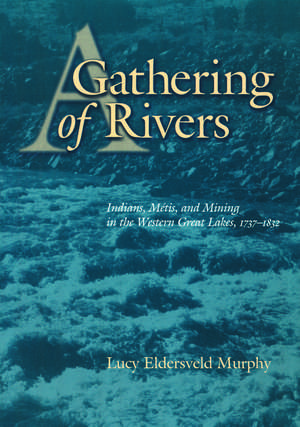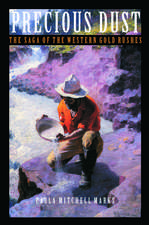A Gathering of Rivers: Indians, Métis, and Mining in the Western Great Lakes, 1737-1832
Autor Lucy Eldersveld Murphyen Limba Engleză Paperback – iun 2004
In A Gathering of Rivers, Lucy Eldersveld Murphy traces the histories of Indian, multiracial, and mining communities in the western Great Lakes region during the eighteenth and early nineteenth centuries. For a century the Winnebagos (Ho-Chunks), Mesquakies (Fox), and Sauks successfully confronted waves of French and British immigration by diversifying their economies and commercializing lead mining.
Focusing on personal stories and detailed community histories, Murphy charts the changed economic forces at work in the region, connecting them to shifts in gender roles and intercultural relationships. She argues that French, British, and Native peoples forged cooperative social and economic bonds expressed partly by mixed-race marriages and the emergence of multiethnic communities at Green Bay and Prairie du Chien. Significantly, Native peoples in the western Great Lakes region were able to adapt successfully to the new frontier market economy until their lead mining operations became the envy of outsiders in the 1820s.
Preț: 158.75 lei
Nou
Puncte Express: 238
Preț estimativ în valută:
30.38€ • 31.82$ • 25.18£
30.38€ • 31.82$ • 25.18£
Carte disponibilă
Livrare economică 19 martie-02 aprilie
Preluare comenzi: 021 569.72.76
Specificații
ISBN-13: 9780803282933
ISBN-10: 0803282931
Pagini: 233
Ilustrații: Illus., maps
Dimensiuni: 150 x 250 x 15 mm
Greutate: 0.37 kg
Editura: Nebraska Paperback
Colecția University of Nebraska Press
Locul publicării:United States
ISBN-10: 0803282931
Pagini: 233
Ilustrații: Illus., maps
Dimensiuni: 150 x 250 x 15 mm
Greutate: 0.37 kg
Editura: Nebraska Paperback
Colecția University of Nebraska Press
Locul publicării:United States
Notă biografică
Lucy Eldersveld Murphy is an associate professor of history at Ohio State University, Newark. She is the coeditor of Midwestern Women: Work, Community, and Leadership at the Crossroads.
Recenzii
"By focusing on the lost history of women and Indians as well as on the complex social relations between the diverse groups in the region, Murphy provides a compelling counterpoint to the conventional view that conflict and Indian removal from the lead district was inevitable."—Journal of the American Ethnic History
"Murphy's study is noteworthy in two respects. First, she finds that the growth of the fur trade did not mean that Native Americans succumbed to dependency on European goods. . . . Murphy also does an excellent job of comparing and contrasting the way changing circumstances affected Native American men and women. . . . A fine study. . . . Through 'A Note on Sources,' Murphy demonstrates the care that she took in analyzing available material in order to let the Indians speak for themselves and to discover the point of view of Indian women."—Kim M. Gruenwald, American Historical Review













